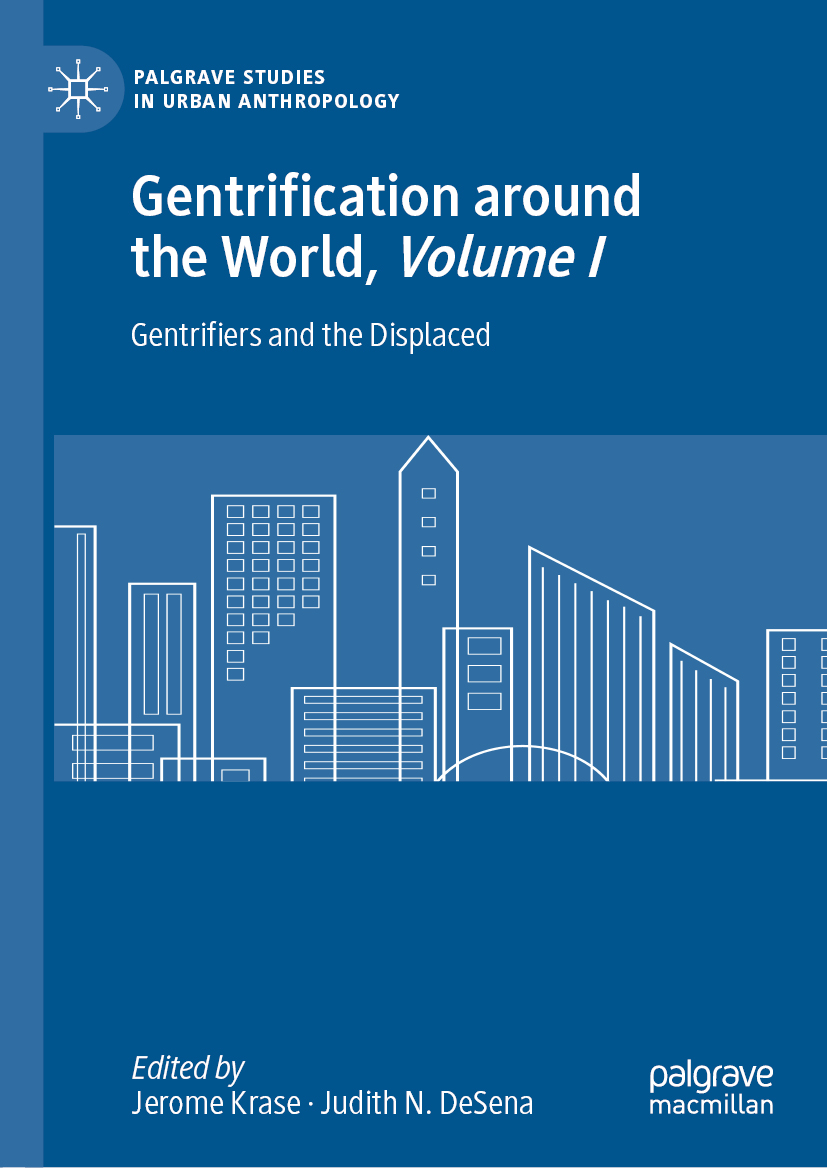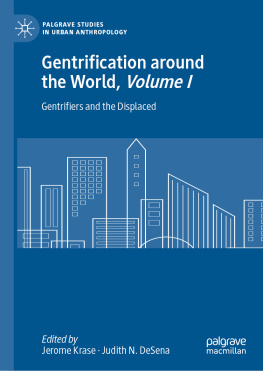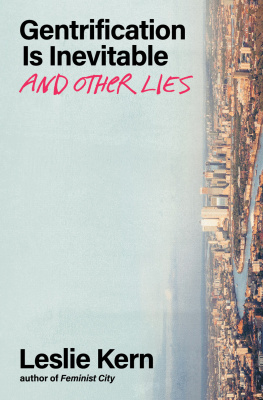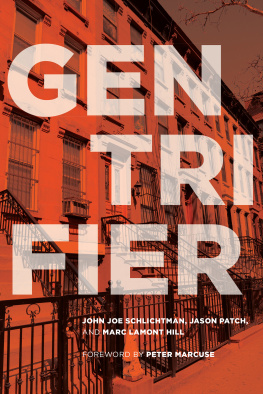Jerome Krase - Gentrification around the World,Volume I: Gentrifiers and the Displaced
Here you can read online Jerome Krase - Gentrification around the World,Volume I: Gentrifiers and the Displaced full text of the book (entire story) in english for free. Download pdf and epub, get meaning, cover and reviews about this ebook. year: 2020, publisher: Springer Nature, genre: Politics. Description of the work, (preface) as well as reviews are available. Best literature library LitArk.com created for fans of good reading and offers a wide selection of genres:
Romance novel
Science fiction
Adventure
Detective
Science
History
Home and family
Prose
Art
Politics
Computer
Non-fiction
Religion
Business
Children
Humor
Choose a favorite category and find really read worthwhile books. Enjoy immersion in the world of imagination, feel the emotions of the characters or learn something new for yourself, make an fascinating discovery.
- Book:Gentrification around the World,Volume I: Gentrifiers and the Displaced
- Author:
- Publisher:Springer Nature
- Genre:
- Year:2020
- Rating:3 / 5
- Favourites:Add to favourites
- Your mark:
- 60
- 1
- 2
- 3
- 4
- 5
Gentrification around the World,Volume I: Gentrifiers and the Displaced: summary, description and annotation
We offer to read an annotation, description, summary or preface (depends on what the author of the book "Gentrification around the World,Volume I: Gentrifiers and the Displaced" wrote himself). If you haven't found the necessary information about the book — write in the comments, we will try to find it.
Gentrification around the World,Volume I: Gentrifiers and the Displaced — read online for free the complete book (whole text) full work
Below is the text of the book, divided by pages. System saving the place of the last page read, allows you to conveniently read the book "Gentrification around the World,Volume I: Gentrifiers and the Displaced" online for free, without having to search again every time where you left off. Put a bookmark, and you can go to the page where you finished reading at any time.
Font size:
Interval:
Bookmark:

Half of humanity lives in towns and cities and that proportion is expected to increase in the coming decades. Society, both Western and non-Western, is fast becoming urban and mega-urban as existing cities and a growing number of smaller towns are set on a path of demographic and spatial expansion. Given the disciplinary commitment to an empirically-based analysis, anthropology has a unique contribution to make to our understanding of our evolving urban world. It is in such a belief that we have established the Palgrave Studies in Urban Anthropology series. In the awareness of the unique contribution that ethnography offers for a better theoretical and practical grasp of our rapidly changing and increasingly complex cities, the series will seek high-quality contributions from anthropologists and other social scientists, such as geographers, political scientists, sociologists and others, engaged in empirical research in diverse ethnographic settings. Proposed topics should set the agenda concerning new debates and chart new theoretical directions, encouraging reflection on the significance of the anthropological paradigm in urban research and its centrality to mainstream academic debates and to society more broadly. The series aims to promote critical scholarship in international anthropology. Volumes published in the series should address theoretical and methodological issues, showing the relevance of ethnographic research in understanding the socio-cultural, demographic, economic and geo-political changes of contemporary society.
More information about this series at http://www.palgrave.com/gp/series/14573

Cover illustration: RobinOlimb/DigitalVision Vectors/Getty Images
This Palgrave Macmillan imprint is published by the registered company Springer Nature Switzerland AG
The registered company address is: Gewerbestrasse 11, 6330 Cham, Switzerland
Simply put, this book is about the process of gentrification with a global perspective. Gentrification, along with resultant displacement, has exponentially accelerated within global cities and has spread throughout the world as a tag along with globalization. While the concept of gentrification originated a half-century ago from observations in London by Ruth Glass (1964), gentrification is expressed today in a multitude of occasionally bewildering forms. This is because the increasingly rapid flow of capital, that created global markets, along with almost cosmic communication systems, has literally created a gentrifying global village. Ironically, despite diverse local settings, visually at least, there appears to be greater urban homogeneity from city to city. Most observers see global gentrification as products of capitalism, or more specifically neoliberalism.
As ethnographers who often take visual approaches to their subjects, the editors professional and personal travels in the world have allowed them to observe and take note of changes that were similar to those they were studying in Brooklyn, New York City. For example, in Paris , glitzy coffee shops were found adjacent to tailor shops staffed by immigrants. In Dublin, upscale housing was being developed near older, smaller, and more modest housing. And in Palma de Mallorca, a restaurant named Brooklyn was identified while in Berlin there was a Brooklyn barbershop. Upscaling, trendy neighborhoods are found throughout Rome in areas that were once avoided. Thus, the idea for this global gentrification project evolved.
DeSena would like to acknowledge the support of her family. Neil Sheehan offered many ideas and comments. Francis Sheehan served as technical support for the assorted digital platforms used to create the manuscript. Paul Sheehan heightened her energy throughout his high school years. DeSena also thanks St. Johns University for including global as part of the mission. In particular, Jeffrey Fagen, Dean of St. Johns College of Liberal Arts and Sciences, supported her ability to see gentrification in cities in Europe. Furthermore, she would also like to pay tribute to her colleagues in the Discover New York program for a multidisciplinary environment allowing for the integration of various perspectives in her research. Finally, DeSena would like to acknowledge her co-editor (at times co-author) for being an exemplary scholar, while maintaining his sense of humor.
Krase acknowledges the patience of his wife Suzanne Nicoletti and his many colleagues, family members, and friends who have been collaborators, and occasional subjects, of his studies of urban life and culture which began shortly after Ruth Glass coined the term. As to thanks for institutional support for his work on global gentrification, he has been the beneficiary of grants from the Professional Staff Congress of the City University of New York, the Fulbright Foundation, Kosciuszko Foundation, and the Polish Ministry of Higher Education. Finally, DeSena and Krase would like to express their gratitude to the anonymous reviewers of our two-volume proposal on gentrification around the world and the editorial and support staff of Palgrave Macmillan as well as Palgrave Studies in Urban Anthropology book series editors Giuliana Prato and Italo Pardo.
Font size:
Interval:
Bookmark:
Similar books «Gentrification around the World,Volume I: Gentrifiers and the Displaced»
Look at similar books to Gentrification around the World,Volume I: Gentrifiers and the Displaced. We have selected literature similar in name and meaning in the hope of providing readers with more options to find new, interesting, not yet read works.
Discussion, reviews of the book Gentrification around the World,Volume I: Gentrifiers and the Displaced and just readers' own opinions. Leave your comments, write what you think about the work, its meaning or the main characters. Specify what exactly you liked and what you didn't like, and why you think so.












